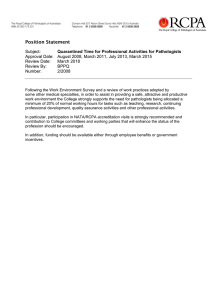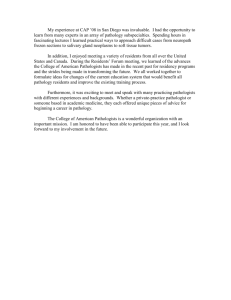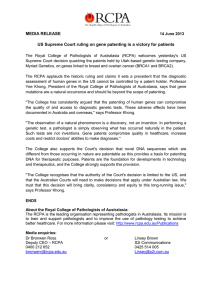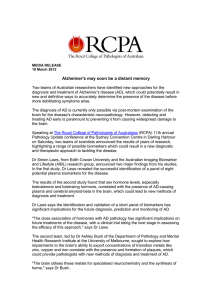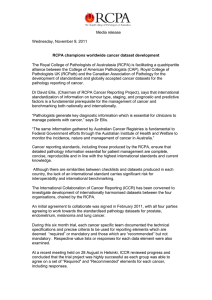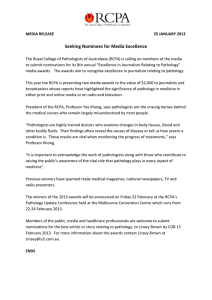RCPA and ILPP RECOMMEND BEST PRACTICE IN CANCER MEDIA RELEASE 28 MAY 2013
advertisement
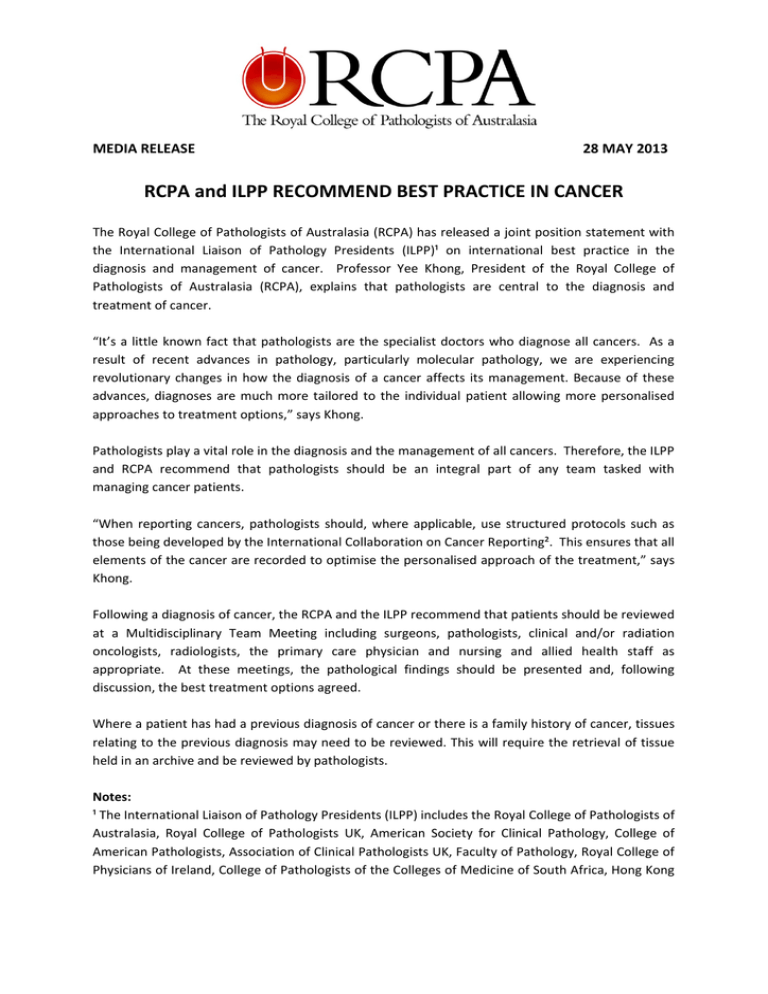
MEDIA RELEASE 28 MAY 2013 RCPA and ILPP RECOMMEND BEST PRACTICE IN CANCER The Royal College of Pathologists of Australasia (RCPA) has released a joint position statement with the International Liaison of Pathology Presidents (ILPP)¹ on international best practice in the diagnosis and management of cancer. Professor Yee Khong, President of the Royal College of Pathologists of Australasia (RCPA), explains that pathologists are central to the diagnosis and treatment of cancer. “It’s a little known fact that pathologists are the specialist doctors who diagnose all cancers. As a result of recent advances in pathology, particularly molecular pathology, we are experiencing revolutionary changes in how the diagnosis of a cancer affects its management. Because of these advances, diagnoses are much more tailored to the individual patient allowing more personalised approaches to treatment options,” says Khong. Pathologists play a vital role in the diagnosis and the management of all cancers. Therefore, the ILPP and RCPA recommend that pathologists should be an integral part of any team tasked with managing cancer patients. “When reporting cancers, pathologists should, where applicable, use structured protocols such as those being developed by the International Collaboration on Cancer Reporting². This ensures that all elements of the cancer are recorded to optimise the personalised approach of the treatment,” says Khong. Following a diagnosis of cancer, the RCPA and the ILPP recommend that patients should be reviewed at a Multidisciplinary Team Meeting including surgeons, pathologists, clinical and/or radiation oncologists, radiologists, the primary care physician and nursing and allied health staff as appropriate. At these meetings, the pathological findings should be presented and, following discussion, the best treatment options agreed. Where a patient has had a previous diagnosis of cancer or there is a family history of cancer, tissues relating to the previous diagnosis may need to be reviewed. This will require the retrieval of tissue held in an archive and be reviewed by pathologists. Notes: ¹ The International Liaison of Pathology Presidents (ILPP) includes the Royal College of Pathologists of Australasia, Royal College of Pathologists UK, American Society for Clinical Pathology, College of American Pathologists, Association of Clinical Pathologists UK, Faculty of Pathology, Royal College of Physicians of Ireland, College of Pathologists of the Colleges of Medicine of South Africa, Hong Kong College of Pathologists, Canadian Association of Pathologists, and the Academy of Medicine of Malaysia, College of Pathologists. ²A Collaboration that currently includes the College of American Pathologists (USA), The Royal College of Pathologists (UK), The Canadian Association of Pathologists in association with the Canadian Partnership Against Cancer (Canada) and The Royal College of Pathologists of Australasia (Australia). ENDS To read the Position Statement us the following URL: http://www.rcpa.edu.au//static/file/Asset%20library/public%20documents/Policy%20Manual/Positi on%20Statements/ILPP%20Joint%20Statement%20on%20International%20Best%20Practice%20in% 20Diagnosis%20and%20Man.pdf About the Royal College of Pathologists of Australasia: The RCPA is the leading organisation representing pathologists in Australasia. Its mission is to train and support pathologists and to improve the use of pathology testing to achieve better healthcare. For more information please visit: http://www.rcpa.edu.au/Publications To read our latest news, follow us on Twitter @PathologyRCPA and ‘like’ our Facebook page https://www.facebook.com/TheRoyalCollegeOfPathologistsOfAustralasia?ref=hl Media enquiries: Dr Debra Graves or Linsey Brown CEO at RCPA S2i Communications 0417 218 528 0425 514 005 debrag@rcpa.edu.au Linsey@s2i.com.au
